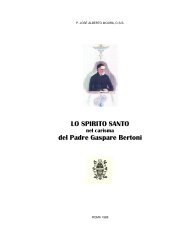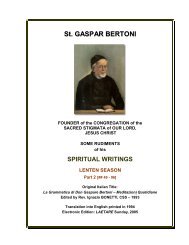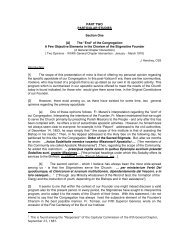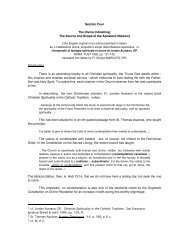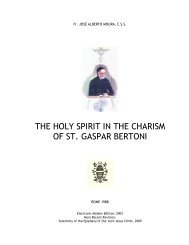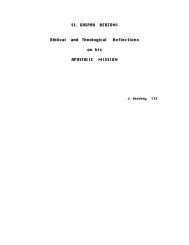1810 - 1813 & Conclusion - St. Gaspar Bertoni
1810 - 1813 & Conclusion - St. Gaspar Bertoni
1810 - 1813 & Conclusion - St. Gaspar Bertoni
You also want an ePaper? Increase the reach of your titles
YUMPU automatically turns print PDFs into web optimized ePapers that Google loves.
MEMORIALE PRIVATO <strong>1810</strong> - MARCH 146<br />
AN INTRODUCTION FOR THE YEAR <strong>1810</strong><br />
On the 6th of February <strong>1810</strong> Brunora Ravelli, Fr <strong>Gaspar</strong>'s mother, died, at the age of 64.<br />
She was the last true vital connection with his family and a spiritual support for his priestly and<br />
apostolic life. On the 20th of the previous month his uncle James Ravelli had also died. He was<br />
56 and had been afflicted by a mental illness, caused probably by psychological tensions as a<br />
consequence of his imprisonment for political reasons. Fr. <strong>Gaspar</strong> had long before given up<br />
hope of contact with his father, Francis, who was living an irresponsible life he could not share.<br />
Apart from a disastrous administration, his father was cohabiting with his former housemaid,<br />
Catherine Slavier.<br />
In March he decided to move out of his family home. He found a shelter with his uncle,<br />
the Scudellini family. Fr M. Marchi (a priest who was very close to Fr <strong>Bertoni</strong>) will later<br />
comment on the event by saying: "After the burial of his mother he abandoned his father's<br />
house and he did as <strong>St</strong> Francis, saying to God "Now I can say: Our Father, who art in heaven..."<br />
308<br />
The changing of residence must have been motivated by a strong spiritual experience<br />
and a step forward in that "detachment" which Fr. <strong>Bertoni</strong> saw as necessary for following Christ<br />
more radically. What he wrote in the note for a Course of Spiritual Exercises to the Clergy, just<br />
after his transfer, sounds autobiographic. In commenting on the incident of the Child Jesus lost<br />
in the Temple and found among the Doctors of the Law, he said:<br />
...without the knowledge of his parents means that He did not want them to<br />
become an obstacle and prevent Him from freely doing His Father's will. Some<br />
priests let themselves be determined by the worldly ambitions of their relatives<br />
in accepting Offices and Benefices. He remained : this means that we have to<br />
detach ourselves from the worldly love of our relatives. We must not hesitate to<br />
even leave our relatives in pain and suffering, when it is necessary, for the sake<br />
of making ourselves available with more diligence for the things of our Father in<br />
Heaven. We should not remain with them for a longer time than it is God's will.<br />
The moment I suspect that my relatives, or any other person in the world,<br />
become a hindrance and prevent me, willingly or unwillingly or with good<br />
intention, from doing God's will... I do better if I leave them without telling them<br />
anything. If they feel offended and react by reproaching me, I should disregard<br />
309<br />
all this and be content in doing God's will.<br />
He had also to change his parish. The Bishop made him assistant priest of the parish of <strong>St</strong><br />
Firmus Major. This was, providentially, the beginning of a very important apostolic activity of Fr<br />
<strong>Gaspar</strong> among the Clergy. In that church he would have, within a couple of years, the<br />
inspiration of founding a new Religious Congregation. 310<br />
†††<br />
308 Summarium Additionale, p. 363.<br />
309 MssB 2485.<br />
310 Web-site Note: Fr.<strong>St</strong>ofella had provided a very brief Introduction for the year <strong>1810</strong> -<br />
the translator compiled this more extended presentation of the year from <strong>St</strong>igmatine<br />
sources.
MEMORIALE PRIVATO <strong>1810</strong> - MARCH 147<br />
10th MARCH <strong>1810</strong><br />
[152.] Fast, so that you may not sin! Fast, because you have sinned!<br />
Fast, that you may receive! Fast, that you may keep what you received!<br />
Fasting is a characteristic of the Christian Religion.<br />
This 10th of March was Saturday after Ash Wednesday. The first sentence of this<br />
note could be both a plan for a sermon on Fasting in four parts, as well as a personal<br />
resolution. This is an insight into the young preacher’s spirit: he lived what he preached<br />
Fr. <strong>Bertoni</strong> could have taken these statements from <strong>St</strong>. John Chrysostom, in one of his<br />
sermons as commentaries on the book of Genesis. We prefer to think that this note was<br />
written as a personal resolution at the beginning of Lent. The formula could have come<br />
to him from Fr. Segneri 311 . The entry of this day, as well as that of the following March<br />
12 th seem to come from these Homilies. These Latin translations of the <strong>St</strong>. John<br />
Chrysostom’s Homilies in Fr. <strong>Bertoni</strong>’s Library came to him from his Grand-Uncle, Fr.<br />
James.<br />
In February 1803 312 Fr. <strong>Gaspar</strong> had given a homily which was inspired by <strong>St</strong>.<br />
Chrysostom's sermon The Lenten Fast to be undertaken with joy. The cry was: Ifast,<br />
because you have sinned! In that homily Fr. <strong>Gaspar</strong> stated that the Lenten Fast,<br />
together with all the other exercises of Christian Penitence, was the most sure remedy.<br />
This is able of recovering and preserving the lost health of the soul. Fasting would<br />
remove evil at its very root. The Lenten Fast as well as all the other exercises of<br />
Christian penance which accompany it, offer a most sure remedy. To support his idea,<br />
he quoted the words of Jesus: this kind of demons are chased away only by Prayer<br />
and Fasting (Mt 17:21).<br />
Then he said Prayer with Fasting is a good thing. When we fast we make our<br />
minds agile, swift and free. We give them wings to fly to God. Towards the end of<br />
the sermon he exhorted the people saying: Let us take care of our souls. We have to<br />
cleanse them and heal them when ailing and keep them sound and healthy for the<br />
future. What is the secret...: Let us look at the Saints... We are Christians! Christ<br />
gave us the example and encouraged us to take this medicine, while He too, for<br />
forty days observed such a strict Fast.<br />
For the last line of the note of <strong>1810</strong>, about Fasting being a peculiarity of the<br />
Christian Religion, we take again from the same homily quoted above, delivered in<br />
1803. He continued:<br />
311 Fr. Paul Segneri, SJ, The Instructed Christian, Part 3, Reason 20. This is found wholly<br />
near the end of sentences 4-7. It is attributed in this source to <strong>St</strong>. John Chrysostom: his<br />
Homily 1 on Fasting. However, all research in the alphabetical Index of his Opera Omnia,<br />
has remained in vain, among those H9milies of his On Genesis [some of these included<br />
in this Web-Site, under <strong>St</strong>. John Chrysostom.<br />
312 Pagine di Vita Cristiana, pp. 262-270, passim – Sermon 16: ‘The Lenten Fast to be<br />
observed with Joy’, February 23, 1806. MssB ## 738 -755. Fr. <strong>Bertoni</strong> also has<br />
commented on <strong>St</strong>. John Chrysostom’s 13 Homilies On Genesis – MssB ## 4615-4852: Gn<br />
1:1-2:17.
MEMORIALE PRIVATO <strong>1810</strong> - MARCH 148<br />
… The common Lord of us all, God as a Father who loves all his children, longs<br />
to remove all the wrongs we committed. Thus He invented for our advantage this<br />
healing method which is the Holy Fast. (Incidentally: could we not refer at this<br />
juncture to his exhortation Fast because you have sinned ). The pagans are<br />
confused, the Jews are scandalized when they see us joyfully and lovingly<br />
accept, as a community, the holy season of Fasting. Let them name feasts their<br />
revelries and drunkenness and all other uncontrolled and depraved behavior. But<br />
the Church of God calls feasts the Fast, the contempt of gluttony and it praises all<br />
other virtues which go with Fasting. (Incidentally, still: could we not say again, here,<br />
with him, Fast so that you may not sin) These are the true feasts : Wherever<br />
there is welfare of souls, where there is harmony and peace, where one gives up<br />
all external [empty] appearances! 313 †<br />
12th MARCH <strong>1810</strong><br />
[153.] Noah did not convert a single person in one hundred years of<br />
preaching against Incontinence.<br />
This sentence too was inspired by a reading from <strong>St</strong> John Chrysostom’s 25 th<br />
Homily In Genesis :<br />
… We have learned that when God showed His wrath and promised disaster, Noah<br />
was five hundred years old. When the Flood came he was six hundred years old.<br />
There are therefore one hundred years between the warning of God and the Flood.<br />
During those one hundred years human-kind did not take heed of the warning in the<br />
least. Noah, on his part, kept on exhorting them while building the ark…<br />
†<br />
†††<br />
†<br />
313 Fr. <strong>St</strong>ofella’s Note: ‘Fast so that you may receive…’ might come from the example,<br />
soon cited in this source, of Moses who with fasting received the tables of the Law So<br />
that what you receive might remain - this also comes from this source – when, after<br />
having broken the Tables, he received them anew in definitive fashion, but only after a<br />
second period of fasting.
MEMORIALE PRIVATO <strong>1810</strong> - MAY 149<br />
18th MAY <strong>1810</strong><br />
[154.] Is it difficult for Mary to intercede Is it difficult for Jesus to grant<br />
us any grace<br />
[This May pf <strong>1810</strong> was the first Month of Mary for the orphaned Fr. <strong>Gaspar</strong>. We can<br />
imagine him even more intensely committed to making the Mother of God his own<br />
mother. We have two important Marian thoughts in this month. The first entry of this<br />
date shows how he put Mary in an outstanding place in his ministry. The second, on the<br />
24th, gives us a prayer which will accompany him all throughout his life. 314 ]<br />
The words any grace is the object of both sentences under this date..<br />
We take some lines from a sermon of Fr <strong>Gaspar</strong> on The Name of Mary 315 :<br />
… Is it difficult for Mary to plead for any grace, on our behalf Not at all!<br />
She is the Virgin Mother of God. She can influence with easiness and<br />
security the heart of the King, her Sovereign and yet her own Son. Is she<br />
not then the owner of all the treasures... of that limitless sea of graces and<br />
mercies She is sung by the Church as Queen of the Angels . Do you<br />
wish to frighten all of Hell Just proclaim the name of Mary with trust…<br />
In his sermon on The Law of the Gospel , 316 he stated:<br />
…Is it difficult for Jesus to grant us any grace Not at all! He invites us<br />
with His own words saying Come to me all you who labor and are heavily<br />
burdened, I will refresh you...<br />
In an earlier sermon on Perseverance 317 he quoted the very words of Jesus<br />
Himself:<br />
… If you, who are wicked though, know how to give your own children<br />
those gifts which they ask of you and which yourselves were given by<br />
God, all the more so your Father in Heaven will give the Good Spirit to<br />
those who ask for it Ask and you will receive. Believe that you will<br />
receive it and it will be done for you.<br />
To conclude here, there is a challenge found in a still earlier Sermon: 318<br />
314 Web-Site Note: this note is added by the Translator to provide the historical setting<br />
for this entry.<br />
315 Pagine di Vita Cristiana, pp. 311-320, passim - ‘The Holy Name of Mary’, September<br />
15, 1805 – MssB ## 1069-1093.<br />
316 Pagine di Vita Cristiana, pp. 23- 32: ‘The Law of the Gospel’, June 5, 1803, the 12<br />
th<br />
Sunday ater Pentecost – MssB ## 813-840.<br />
317 Pagine di Vita Cristiana, pp. 111- 120, Sermon 17, ‘On Perseverance’, April 11, 1803,<br />
Easter Monday – MssB ##773-793.
MEMORIALE PRIVATO <strong>1810</strong> - MAY 150<br />
… Jesus Christ awaits you, Mary calls you…!<br />
†<br />
[154a.] We have to purify our minds thoroughly.<br />
The last line of this Journal entry under this date sounds as the condition for<br />
obtaining the graces from Jesus through Mary. A thorough purification of the mind is<br />
indispensable in order not to put any obstacle to God's generous giving. It is an<br />
expression on the same radical level as the entry of May 1809 about universal<br />
mortification. The ideal is noted as well on the 14.15.16.23.24 July 1809 about the<br />
absolute requirements for Perfection.<br />
†<br />
24th MAY <strong>1810</strong><br />
155. In a Monastery, where even the smallest rules are observed,<br />
there the vigor of the Monks remains unchanged and there is peace<br />
among brothers. Where, on the contrary, the Religious do not take any<br />
account of the little transgressions, there the whole community is little by<br />
little dissipated and is destroyed. (<strong>St</strong> Anselm of Canterbury, in his Letter<br />
on Ep 6).<br />
With all due regard to Fr. <strong>Bertoni</strong>, this citation is not found in Anselm’s Commentary<br />
on Paul’s Letter to the Ephsians, c. 6. It is found rather that this is a citation of a<br />
second, or even third hand. It is found instead in Cornelius a Lapide's commentary on<br />
Sirach 19:1 He that contemns small things, shall fall little by little... There follows<br />
then the comment from Cornelius: This golden sentence of <strong>St</strong>. Anselm, Letter 6, to the<br />
Cistercian Monks. This is a most certain sign, he says, that we have learned in many<br />
churches. This is the counter-sign of that full certitude that we have learned from<br />
experience. Here is the original text: It is the surest pattern which we have been<br />
confirming from experience in the life of many communities. The fact, namely, that in a<br />
monastery where the tiniest rules are very strictly kept, there the austerity of the<br />
monastic life remains unchanged…<br />
We should note that Fr <strong>Gaspar</strong> did not use the Latin adverb districte (= very<br />
strictly) and he chose strength (vigor ) instead of austerity (rigor ). In the text of<br />
Cornelius a Lapide, after the peace among brothers, we read: And in the Chapter -<br />
room the animated discussions are quieted down. Then he wrote Community with a<br />
capital O(Ordo ), meaning the entire Order: which makes the consequence of the laxity<br />
of monastic life that endangers the whole Cistercian Order of monks, not only their<br />
small community. [It should be noted lastly, that in Cornelius a Lapide's text, there is a<br />
corollary in good Latin: ubi rigor ibi vigor (where there is austerity there is strength) 319 .<br />
†<br />
318 Pagine di Vita Cristiana, pp. 301-311. Sermon 8, December 13, 1801, ‘Feast of the<br />
Translaiton of the Holy House of Loreto’ – MssB ## 572-592.<br />
319 Translator’s Note.
MEMORIALE PRIVATO <strong>1810</strong> - MAY 151<br />
[156.] Let us pray for our Princes: may the Lord speak to them words of<br />
peace in favor of His people (Ps 85:9); may He give them desire for<br />
harmony. Let us pray also for our Pastors that they might dedicate<br />
themselves to the reformation of the Church. As you can see, everything<br />
is getting ruined. If the Church does not find the way for some<br />
reformation, there is no hope for a better situation. (<strong>St</strong> Thomas of<br />
Villanova, p 65,D).<br />
This comment seems to have been noted first hand by <strong>St</strong>. <strong>Gaspar</strong>, from the<br />
Sermons of <strong>St</strong>. Thomas of Villanova. The antiquated citation system has been used by<br />
Fr. <strong>Bertoni</strong>.<br />
<strong>St</strong>. Anselm of Aosta [1033-1109] and <strong>St</strong>. Thomas of Villanova [1488-1555] - As<br />
for the previous note which carried the quotation of <strong>St</strong> Anselm, we seem to hear Fr<br />
<strong>Bertoni</strong> remarking: "You see, the problems of those times are repeating themselves in<br />
our own times!"... In that month of May <strong>1810</strong>, the worries were quite similar.<br />
On 11 May a Decree was signed by Napoleon at Compiègne, and on 25 April,<br />
had been proclaimed in Verona. It abolished "all the ecclesiastical establishments,<br />
corporations, congregations, communities and associations of any nature and<br />
denomination." It made "exception of bishoprics and archbishoprics, seminaries,<br />
cathedral chapters and of the larger parishes, hospital care-givers, sisters of charity and<br />
other houses for the education of girls which We shall decide to be retained with special<br />
Decrees." The Royal Decree secularized convents and monasteries. It abolished the<br />
religious habits and the monastic life. It sent nuns, monks and religious back to their<br />
families, granting them a pension for life, for each one according to the hierarchical<br />
status they had in their respective Orders. The cloisters were to be evacuated and the<br />
Friars had to vacate the premises before the last day of May. The Nuns were given<br />
more time for the evacuation: until the end of July." 320 This is only one aspect of the<br />
historical tragedy of those times. Pope Pius VII and many other eminent ecclesiastics<br />
had been arrested and imprisoned. Within the Church the new ideas of the French<br />
Revolution had caused divisions among Bishops and Cardinals. Many of the Clergy and<br />
the people of God became confused and polarized.<br />
Fr. <strong>Bertoni</strong>, as far as he was concerned, and with the wisdom of saints, saw in<br />
Napoleon's wicked dealings a superior plan of God. In his instructions to the<br />
Seminarians he tried to read Napoleon's Decree in the light of the events, which are<br />
the language of God. Thus, in the very suppression of Religious Houses and<br />
Monasteries, perpetrated in those months he saw also the judgment of God against the<br />
widespread decadence of the Monastic discipline and of the Religious spirit. Similar<br />
causes and effects had been described by the above quoted <strong>St</strong> Anselm.<br />
320 Perini, History of Verona, Vol. III, pp. 214, ff.
MEMORIALE PRIVATO <strong>1810</strong> - MAY 152<br />
As Saint Thomas of Villanova said before the Council of Trent, Fr <strong>Bertoni</strong> saw no<br />
other hope except a general reformation which the Clergy should have performed<br />
among themselves. He was happy to be able to present the courageous behavior of<br />
the Holy Father Pope Pius VII: This corner - stone is upright and firm. In the<br />
unfailing uprightness of the First <strong>St</strong>one there is displayed and disowned the<br />
crookedness of the Worldly Spirit in both subordinate and superior Ministries of<br />
the Church. 321<br />
It was in this context that the idea of collecting around himself some zealous<br />
priests for a new Congregation began to take real shape, through the reading of the<br />
signs of the times 322 . The spirit of the many entries in the Journal on this day is clearly<br />
revealing the desire to reform himself and others. The request from the Bishop to<br />
become the Spiritual guide of the Seminary and to preach a month of Ignatian Spiritual<br />
Exercises, in September, will find him humbly surprised and obedient, but will<br />
encourage him to embark in his long apostolate among the Clergy.<br />
†<br />
[157.] Today, therefore, if you shall hear His voice... harden not your<br />
hearts as those ones did, to whom He swore in His wrath... if they will<br />
enter into His rest.<br />
The Latin text of Ps 94:8,11 is put together rather at random. Just where Fr. Berotni<br />
found the text this way, is not known. In the original it sounds as follows: Oh that<br />
today you would hear His voice: harden not your hearts as (the Israelites did) at<br />
Meribah and in the day of Massah in the desert... Therefore I swore in my anger:<br />
they shall not enter into my rest.<br />
It appears clearly that this note is very closely connected to the previous two.<br />
That therefore, which is not in the biblical text, is the word which gives the tone to the<br />
sentence. It seems to say: "Look at the events: let them talk! They are the language<br />
of God. Woe to those who harden the ear and the heart in front of these such solemn<br />
lessons... The Lord says: They will not enter into His rest!<br />
†<br />
[158.] A hardened heart will be in great trouble at the end.<br />
The correct and complete text, as we have seen on 9 Aug 1808, is in Si 3:27. A<br />
hard heart shall fear evil at the last: and he that loves danger shall perish in it…<br />
This sounds like a marginal note to the previous entry: Do not harden your hearts...<br />
"because a hardened heart will end up in trouble." It will be damnation... cf. 9 Aug<br />
1808 and 17 March 1809.<br />
†<br />
321 <strong>St</strong>. <strong>Gaspar</strong>’s Conferences based on <strong>St</strong>. Gregory’s Exposition on Primum Regum -<br />
Meditations 13 and 20 January 1811 – Meditation 13 [## 5296 – 5336] - 1 Reg. 2:26- 29;<br />
Meditation 14 [## 5337 – 5383] – 1 Reg. 2:30-36 [Jan 20, 1811: Most Holy Name]<br />
322 Translator’s thought.
MEMORIALE PRIVATO <strong>1810</strong> - MAY 153<br />
[159.] I greet you, O my Mother: give me your blessing; bless me and all<br />
who are dear to me. Vouchsafe to offer to God all I have to do and suffer<br />
today, in union with your merits, as well as those of your Blessed Son. I<br />
offer you and consecrate to your service all my being and whatever<br />
belongs to me placing everything under your protection. Obtain for me,<br />
my dear Lady, purity of soul and body, and grant that I may not do<br />
anything today displeasing to God; I entreat you through your Immaculate<br />
Conception and your perfect Virginity [ before the birth, in the birth and<br />
after the birth].<br />
(A Hail Mary for the person who wrote this prayer.)<br />
Following the four texts that are so closely linked, that we may call belonging to<br />
the reform of the Church, here – without any change in the date – we find a beautiful<br />
prayer. This is a real treasure for the understanding of Fr <strong>Bertoni</strong>'s spirit. We think that<br />
this text became part of his daily morning prayers. This will then be followed by a series<br />
of Patristic texts with varied thoughts. And then lastly, two short lines from a Psalm.<br />
We have the suspicion that all these entries were placed on different days – but the<br />
Servant of God who had written this notebook for his own eyes only, does not indicate<br />
any change of date. These entries from May 24 th -31 st , just as they are, will round out the<br />
entries for this year <strong>1810</strong>.<br />
We have already noted 323 that this prayer is a real gem, and it does not seem<br />
easy every to exaggerate its value. The last line A Hail Mary... seems to exclude the<br />
possibility that it was a personal composition. He took it from some source and, finding it<br />
very proper for himself, he added also the spiritual token for the demands of honesty,<br />
with regard for the unknown author. The Founder has handed this on to us through its<br />
inclusion in his Journal.<br />
If we examine this prayer, we can easily see it as an expression of the Treatise<br />
of the True Devotion to the Virgin by <strong>St</strong> Grignon Marie de Montfort (+ 1716). In Fr.<br />
<strong>Bertoni</strong>’s time this Treatise was already written for a while, but it remained hidden until<br />
1842. Since that year it began to be spread very widely in the Church. The wording of Fr<br />
<strong>Bertoni</strong>'s prayer is very close to the expressions of Spiritual Slavery of <strong>St</strong> de Montfort's<br />
doctrine.<br />
This prayer is already in the spirit of a total dedication to Mary as the Mother and<br />
Lady of the House. We should greet her every day as such. Our offerings and prayers<br />
pass to God through her hands, and similarly all our daily activities and suffering, in<br />
union with her merits and those of her Divine Son. The whole of ourselves and our<br />
world, every day, are placed at her service: all under her mantle... <strong>St</strong> Grignon de<br />
Montfort could not agree more!<br />
323 Collectanea <strong>St</strong>igmatina, Vol. 1, p. 341.
MEMORIALE PRIVATO <strong>1810</strong> - MAY 154<br />
In return for this service, we expect every day purity of mind and body and that<br />
we should not do anything which can displease God.<br />
A strong foundation for our petition to Mary is her great privilege as the<br />
Immaculate Conception . Fr <strong>Bertoni</strong> supported the doctrine of Mary's Immaculate<br />
Conception long before the dogmatic definition of 1854.<br />
In all the research, this text of this prayer has not yet been uncovered. This is so<br />
despite having pondered the prayer manuals of many Marian Congregations. A partial<br />
text, though, perhaps even the substance of the second part of the text. Might be found<br />
in an invocation that was in use of the old Preces Matutinae [Latin for Morning<br />
Prayers] often used by Priests and Seminarians. The title of one of these prayers was<br />
dedicating to that of commending the living of chastity, The text reads: By your<br />
Immaculate Conception, and most pure Virginity, cleanse my heart and my body, a<br />
Mother and Virgin before the Birth, in the Birth and after the Birth. 324 .<br />
With this in mind, does not the deMontfort devotion pertain quite closely to<br />
<strong>St</strong>igmatine Spirituality<br />
†<br />
[160.] To be sure that your will is sufficient, see whether it is<br />
accompanied by your effort. (<strong>St</strong> Augustine)<br />
The text is from a Letter 127 addressed by <strong>St</strong>. Augustine to the saintly couple<br />
Armentarius and Pauline. He wrote:<br />
… It is necessary to put effort into action in order to obtain things which are wanted and<br />
loved. The will is not sufficient when the power is lacking. Righteous living -if we want<br />
it- is already a fact. When we really want it, it is already justice. To practice it, is<br />
sufficient that we want it fully and completely…<br />
<strong>St</strong> Augustine intended to encourage that couple not to draw back from the vow of<br />
conjugal celibacy. The expression "Righteousness is reached by nothing other than<br />
perfect will"... is summarized and expressed by the following note of Fr <strong>Gaspar</strong> on the<br />
same day:<br />
†<br />
[161.] One who has good will has everything, but the will is not good if<br />
it does not do what it can. (<strong>St</strong> Augustine)<br />
We already know this text from the entries of 22 Feb and 22 March. However, we<br />
have failed to find the precise words in the works of <strong>St</strong> Augustine. The second part is<br />
evidently an extension and explanation of the first. At any rate we should like to<br />
complete the text with an authentic Augustinian quotation: "Without the grace of God,<br />
man cannot have even good will". 325 †<br />
324 Veni mecum piorum Sacerdotum. Patavii 1753, p. 14.<br />
325 Letter 188, 7 to Juliana, widow, the mother of Demetriadis.
MEMORIALE PRIVATO <strong>1810</strong> - MAY 155<br />
[162.] We need will: not just any one, not the ordinary one, but<br />
consistent and genuine. (<strong>St</strong> John Chrysostom)<br />
The text is from the Introduction to the Saint’s Homilies on <strong>St</strong>. John's Gospel. We<br />
can summarize the thought of <strong>St</strong> John Chrysostom as follows:<br />
… One cannot possibly understand <strong>St</strong> John, the Evangelist, unless he purifies his soul<br />
as if he had to enter into Heaven. Do not tell me that 5 days are not sufficient. This is<br />
the time namely which it takes to follow [my talk] from the introductory Homily until the<br />
beginning of the treatise. The Good Thief, who was a rascal and a murderer, reached<br />
the height of virtue and of Paradise in an instant. The mud that we are can be changed<br />
immediately into pure gold. Don't you see that one needs only to want it I don't mean<br />
any will or ordinary will, but consistent and genuine…<br />
The expression of <strong>St</strong> John Chrysostom agrees easily with <strong>St</strong> Augustine's texts. The<br />
point is always the same: the service of God and the spiritual life require the<br />
engagement of the whole human will, but always with the assistance of the Holy Spirit.<br />
<strong>St</strong> Augustine said again: "Good will without the help of the Holy Spirit cannot work. 326<br />
†<br />
[163.] To live in a Christian way among Christians is [looked upon] as<br />
shameful. (<strong>St</strong> Bernard).<br />
This sentence reflects the difficult times of <strong>St</strong> Bernard's. We cannot however find a<br />
proper source for this quotation in the works of the Saint. Fr. <strong>Bertoni</strong> found that this text<br />
- as well as the ones which follow on this day - reflected the appalling situation of his<br />
times, too. He will use these texts in his daily ministry, when he had to denounce the<br />
spiritual disaster that human respect was causing among people.<br />
†<br />
[164.] People believe in the world. They believe in the Devil. They<br />
believe in the body. But in the only God of truth they do not put their<br />
security.<br />
The text (which is not given the source) will be used by Fr <strong>Bertoni</strong> again in the 17th<br />
Meditation on the first Book of Samuel. There, he will use faith instead of security.<br />
He criticized the unbelief, the naturalism and the licentiousness of his times.<br />
†<br />
[165.] How long will you judge unjustly: and accept the persons of the<br />
wicked ...They have not known nor understood: they walk on in<br />
darkness: all the foundations of the earth shall b e moved … (Ps 81:2,5)<br />
Fr. <strong>Bertoni</strong> seems to condemn the injustices perpetrated in his time using the<br />
authority of the Word of God. The Latin word should be in the plural: peccatorum .<br />
This is a text that condemns contemporary injustices. One comment holds that they<br />
are in ignorance, deprived of the good of their intellect; they walk in darkness – and the<br />
foundations of this world are shaken…<br />
†††††<br />
326 <strong>St</strong>. Augustine, Concerning Patience, c. 24.
MEMORIALE PRIVATO 1811 - JANUARY 156<br />
AN INTRODUCTION FOR THE YEAR 1811<br />
In 1811 Fr. <strong>Bertoni</strong> was very much engaged in the Diocesan Seminary<br />
of Verona. He had to hear confessions and do Spiritual Direction with preached<br />
Meditations on Sundays and Feast Days. He gave Spiritual Exercises to the<br />
Candidates for Ordination. At the same time he was asked to give monthly<br />
Recollections and spiritual assistance to the College of the Acolytes together<br />
with some other ministries for the Clergy and the people as a whole. He<br />
continued to give Spiritual Direction and personal assistance to the girls and<br />
consecrated women of the Canossian "Retreat". Of great importance was the<br />
beginning of the systematic Spiritual Direction of the Superior of the "Retreat"<br />
i.e. Mother Leopoldina Naudet who was busy forming the new Religious<br />
Congregation called "Sisters of the Sacred Family". The first of the very few<br />
entries of the Journal in 1811 was in connection with this Direction.<br />
†††<br />
12th JANUARY 1811<br />
[166.] You should not study for the direction of N.N.<br />
You should rather appeal to the Source of Light.<br />
In this way you will have an advantage for yourself too.<br />
You should not walk before the Lord but follow Him, Who will enlighten<br />
you. Provided you ask Him, He will suggest to you the way to make her<br />
progress and respond.<br />
Only in 1930 were we able to detect the name hidden under the N.N.. We were<br />
given the hand-written Spiritual Diary of Leopoldina Naudet and were able to compare<br />
it with Fr. <strong>Bertoni</strong>'s entry in his own Journal. This was on the occasion of a particular<br />
study which appeared as a Supplement to the <strong>Bertoni</strong>ano of 1930, for the 77 th<br />
anniversary of the death of Fr. <strong>Gaspar</strong>. This study covered about 80 pages, and bears<br />
the title: The Spiritual Diary of Leopoldina Naudet and the Venerable Fr. <strong>Gaspar</strong><br />
<strong>Bertoni</strong>.<br />
Leopoldina's Diary began on 9 Jan 1811 with an abrupt note which reported that<br />
she expressed the desire of having an external help... in being directed in her spiritual<br />
journey, beside the Lord. She did not mention the name nor did she describe the<br />
encounter. She stated: I exposed the spiritual desires that I had… but she does not<br />
say to whom.<br />
From what we know of the life of Leopoldina Naudet, she was comfortable to be<br />
guided by God alone. Suddenly she felt as if having a dialogue with the Lord in the<br />
following way: "- Entrust yourself to my Minister! - ‘My Lord, I am so comfortable with<br />
You! - ‘I tell you to entrust yourself to him: you will feel even more comfortable with Me!"<br />
The encounter with Fr <strong>Bertoni</strong> took place during the weekly Confessions on Wednesday<br />
9 Jan.
MEMORIALE PRIVATO 1811 - JANUARY 157<br />
In her evening private prayer Leopoldina heard again the Lord as if giving further<br />
assurance of the goodness of that decision. She wrote He told me that He asked me to<br />
do that because He was sure that that person was going to continue what He wanted of<br />
me." 327 "Some days after that" - she wrote again - "he (i.e. Fr <strong>Bertoni</strong>) gave me as<br />
Particular Examen to imagine myself always in the presence of God, and to do<br />
what we understand is of His pleasing".<br />
This went on until 2 March. On that day she wrote: "I was told to begin the<br />
Particular Examen on the following words of <strong>St</strong> Gregory, In anything that you do look<br />
always to Jesus. Direct your life towards Him. Recognize Him as the one who came to<br />
us to give us His grace and to number us among the Elect, through our humanity which<br />
he has put on. This very text was commented by Fr. <strong>Bertoni</strong> to the Seminarians on 20<br />
Jan, the second Sunday of the Epiphany. On this day, there was celebrated the Most<br />
Holy Name of Jesus. The Biblical text was 1 K, c. 2: He will walk always before my<br />
Christ. Each of the Elect is to walk in the presence of Christ. In all that one does, he<br />
should always look toward Him, and to Him direct the rectitude of one’s life, as He has<br />
come on earth to recompose, through the Humanity that He has assumed, the number<br />
and the Grace of the Elect. We have also reason to believe that the same text was<br />
used by Fr. <strong>Bertoni</strong> for his own Particular Examen. <strong>St</strong>. <strong>Gaspar</strong> had preached on these<br />
texts to the Seminarians of Verona. 328<br />
There is a very important remark to make here. The probable reason for the<br />
progressive reduction of entries in his Journal until it reached a complete stand still, is to<br />
be found in the fact that every thing which he wrote in connection with Spiritual Direction<br />
and Spiritual Formation was all Spiritual Journal. He felt involved at a deep personal<br />
level every day of his life.<br />
It is interesting to compare Leopoldina's first entry in her DIARY with the spirit of<br />
Fr <strong>Gaspar</strong>'s note on 12 Jan. Mother Naudet wrote:<br />
… The Lord made me understand that to be assisted I had to ask for counsel from<br />
Him alone, and trust that He will give me His light. It seemed that He said that to<br />
direct me there was no need of learning, because what operates in me was only one<br />
thing, namely Love. This is the main activity. I therefore need only help towards this.<br />
And this can be drawn only from the same Source and not from learning…<br />
The last sentence of Fr <strong>Gaspar</strong>'s note (which shows some similarities in<br />
Leopoldina's Diary) completes the resolutions of the new Spiritual Director. It is a<br />
practical application of the principle of action which will appear as a characteristic of his<br />
whole life. You will not precede, go on ahead of God, but will follow Him! With<br />
327 Mother Naudet’s Diary appears in this Web-site.<br />
328 <strong>St</strong>. <strong>Gaspar</strong> Conferences on <strong>St</strong>. Gregory’s Exposition in Primum Regum - Meditation 14<br />
[## 5337 – 5383] – 1 Reg. 2:30-36 [Jan 20, 1811: Most Holy Name]
MEMORIALE PRIVATO 1811 - JANUARY 158<br />
regard to this we should like to pick up again what Fr Marani wrote in Notes about the<br />
Congregation , two years after Fr <strong>Bertoni</strong>'s death:<br />
… I want to explain what happened as we followed the plans of God. Indeed we<br />
have to follow after God and not walk in front of Him. This is what my beloved<br />
Father used to say frequently and what he used to practice all the time...<br />
In the particular case of January 1811 that principle found its clearest, most<br />
effective and beautiful expression.<br />
This entire entry is highly recommendable for the reflection and practice of Spiritual<br />
Directors of people who intend to grow sincerely in their spiritual life. The spirit of it,<br />
however, is to be cherished by all of us.<br />
†††
MEMORIALE PRIVATO 1811 - APRIL 159<br />
28th APRIL 1811<br />
[167.] Watch and pray: This summarizes all the advices of Scripture<br />
and of the Gospel.<br />
WATCH: This means we have to be fully awake and strong: but without<br />
weapons. One could not resist if attacked: we shall be conquered.<br />
PRAY: This means to be well armed, but asleep. If we are to be<br />
attacked we shall be stripped of our arms and killed by treachery.<br />
Watch and pray! This is a man who is strong, awake and well armed. He<br />
won't be conquered.<br />
There is not much to say. This text of <strong>St</strong>. Matthew 26:41 was already considered in<br />
the context of Contemplative Prayer, on 5 July 1808. The short comments to the text<br />
sound here decisively as imperatives for the will. They worthily correlate all the texts<br />
which deal with temptation and struggle. Didn't he say on 24 July 1809 that we must<br />
get ready for a great war with Hell<br />
†††
MEMORIALE PRIVATO 1811 - MAY 160<br />
18th MAY 1811<br />
[168.] Undertake the spiritual journey by the narrow way and by<br />
Penance.<br />
The text is inspired by the verse in Matthew 7:14: Narrow is the road that leads<br />
to life. It could have been an inner voice, or taken for such by Fr. <strong>Bertoni</strong> who wanted<br />
to register it on paper and make it into a personal resolution. It could otherwise have<br />
been a generous resolution developed by himself which became a decision of his<br />
conscience in imitation of the Saints. What we are sure of is that he took it very<br />
seriously. So seriously that his biographers gave the blame to the severe miliary fever,<br />
which flattened him in 1812 and put his life in jeopardy, due also to his excessive work.<br />
He had not spared himself in the ministry and in the acts of penance: fasting and<br />
mortification to gain self control. Furthermore, he was convinced that in order to<br />
correspond to the graces God gave him and to follow the mission he felt he was<br />
invested with, he could do nothing less than that.<br />
†<br />
[169.] I shall forget your sins, and I shall show you how many things<br />
you have to bear for my name.<br />
It sounds like part of a dialogue between the Lord and his Servant. God calls Fr.<br />
<strong>Bertoni</strong> to the undertakings of His glory. Fr <strong>Bertoni</strong>, (we suppose), objected like <strong>St</strong>.<br />
Peter after the first miraculous catch of fish: Depart from me, Lord, because I am a<br />
sinner (Luke 5:8). The Lord replied: I shall forget your sins... (Is 43:25) or I shall<br />
never again recall their transgressions (Heb 10:17). He repeats what he had said to<br />
<strong>St</strong> Paul: I shall show him how many things it is necessary that he should bear for<br />
my name. (Ac 10:16). Similar words have been directed to several Founders of<br />
Religious Orders. Fr <strong>Bertoni</strong> will address these - and in Latin! - to Leopoldina Naudet on<br />
14 Dec 1812. He will even add, jokingly as Saints can do: Take courage! This is the<br />
best share which God keeps in store for His beloved ones: ...it is not a mouth-full<br />
for all!<br />
†<br />
[170.] Very few are the people who have the perception of what God<br />
would do of them if He was not hindered by them in His plans.<br />
It is the great Ignatian principle which became one of the corner-stones of Fr.<br />
<strong>Bertoni</strong>'s spirituality. Here it is presented in the form in which Fr. Mariani, S.J. reported<br />
it. It is worthwhile to quote here the original form as we have it in Bartoli's book:<br />
… Very few are those who have the perception of what would God do with them, if they<br />
would put themselves totally into His hands and let His grace work in them. One would<br />
never believe that a rough and shapeless trunk of a tree could become a statue which<br />
will be admired as a miracle of wood-carving. That trunk, if it depended on itself, would<br />
never let itself be cut by the chisels of a wood cutter. Only the wood cutter, as <strong>St</strong>.<br />
Augustine said, can foresee with his artistic eye what could come out of the trunk.<br />
Similarly there are many people who think they can just live as ordinary Christians.<br />
They have no perception that they could become saints if they just let themselves be
MEMORIALE PRIVATO 1811 - MAY 161<br />
fashioned by the grace of God and, by making resistance to God's work, would not<br />
spoil the design that God should like to realize in them… 329<br />
It is clear that the principle written by Fr. <strong>Bertoni</strong> is a summary of all this. In a<br />
Meditation in Primum Regum to the Seminarians he used it several times and made a<br />
moving application of it. We have noticed it already on 29 July 1809 but did not explain<br />
it:<br />
…We cannot imagine what would God do of us, who are the apple of His<br />
eye, if we could not raise obstacles to His Grace, but would instead<br />
surrender ourselves always and totally to His hands…<br />
For that expression: apple of His eye Fr. <strong>Bertoni</strong> quoted Zc 2:8: For he that<br />
touches you (i.e. my priests) touches the apple of My eye …<br />
†<br />
†††<br />
†<br />
329 Bartoli, o.c., Book 4, n. 36 margin.
MEMORIALE PRIVATO 1812 - MAY 162<br />
AN INTRODUCTION FOR THE YEAR 1812<br />
Fr. <strong>Bertoni</strong> continued with great determination his apostolate and his penances<br />
until October, the month during which a very severe illness struck him. He was hardly<br />
recovering from that illness, when Bishop Innocence Liruti gave him more ministries to<br />
accomplish in the Seminary. He had to suspend the assistance to the Canossa<br />
"Retreat", except for the Direction of its Superior, Mother Leopoldina Naudet.<br />
†<br />
Before presenting an outstanding "gift of Prayer" which Fr <strong>Bertoni</strong> received on 30<br />
May 1812 (during the Octave of Corpus Christi), we should like to give an extract from<br />
Leopoldina's Diary. It deals with an experience of ecstasy which she tried to resist,<br />
during the Mass of Holy Thursday which on that year fell on 26 March:<br />
… While thinking of the Institution of the Blessed Sacrament I was taken in spirit to the<br />
place of the Last Supper. In the contemplation of what was going on there I felt being<br />
very pleasantly but strongly drawn out of myself. I abandoned myself and surrendered<br />
to the power and pleasantness of that pulling force. When I realized that my body was<br />
also going to be involved and it started to lose its sensitivity, my natural reaction forced<br />
me to become distracted. I did that, however, with some hesitation. I knew that I was<br />
told not to do like that and to trust in God. Notwithstanding that I gave myself an<br />
excuse thinking that what I was experiencing could be a physical weakness. I<br />
continued to distract myself in order to have control over my feelings and to remain self<br />
conscious..<br />
Fr <strong>Bertoni</strong> had previously advised her with a statement so characteristic of him: Do<br />
not resist God. Trust in God! What would have happened on that Maundy Thursday if<br />
Leopoldina would not have resisted the attractions of God, seems that her Spiritual<br />
Director experienced himself a couple of months later on 30 May 1812.<br />
†††<br />
30th MAY 1812<br />
[171.] While in prayer before Mass I was taken over by some<br />
drowsiness and I heard from the Crucifix these words addressed to my<br />
heart: Look at this Heart of mine ! Those words immediately brightened<br />
my mind with light and my heart felt suddenly a great fervor. Then it was<br />
as if my spirit rose up to see the lovable object which was indicated. I felt<br />
a shivering throughout my whole body. I found I had my eyes and mouth<br />
closed but my soul was wide awake and full of delight.<br />
It seemed that my soul wished to separate itself from my body. It seemed<br />
to be dying and yet to enjoy this. When it turned again back with desire<br />
towards the one who was talking to it, I had another shivering and the<br />
feeling of a sweet painful death. My soul was then confused about what<br />
to do. If the experience had continued it was going to die or at least to be<br />
separated from the body. In such inability to act, it rested with delight in
MEMORIALE PRIVATO 1812 - MAY 163<br />
the hands of the Lord and finding great peacefulness it was ready to die in<br />
that very moment. Then, in an instant, it regained contact with the senses.<br />
The effect of this was a very tender devotion to the Sacred Heart. During<br />
Mass I was full of sentiment. My soul was moved to tears at Holy<br />
Communion. After Mass I kept much recollection and gladness for the<br />
whole day with an increase of Faith, Hope and Charity. 330<br />
The text is worth reading and meditating with devotion. This would be sufficient to<br />
understand it and to savor it without pretending to penetrate the deep phenomena which<br />
it narrates. However some remarks are helpful. We take from what Fr. Dalle Vedove<br />
wrote with regard to that mystical experience of Fr <strong>Bertoni</strong>:<br />
… It is probable that he was preparing in those days the homily for the Feast of the<br />
Sacred Heart, the following Friday. Spending nights in work, study and prayer makes<br />
one somehow drowsy early in the morning. But Fr <strong>Bertoni</strong>'s drowsiness was not just<br />
natural: it was that turgidity and tying up of the human faculties which is characteristic of<br />
mystical experiences. The words Look at this Heart of mine ! were heard distinctly.<br />
What followed was like a flash of lightning: an irresistible desire to see the lovable<br />
object which was indicated.<br />
… The sudden and almost violent way in which Fr. <strong>Gaspar</strong> was taken by this mystic gift<br />
showed that it was not a simple ecstasy, which should have developed slowly and<br />
pleasantly, but rather a real rapture or flight of the spirit. The effects of this<br />
extraordinary experience invaded not only the spiritual faculties of mind and will but<br />
also the physical ones with characteristic phenomena like shivering of the body and<br />
shutting off of sight and voice. He even reached, twice, the state of alienation close to<br />
death. Yet the whole experience was described as delightful and in great quiet. The<br />
rapture in front of the Crucifix marks the height of Fr. <strong>Gaspar</strong>'s extraordinary spiritual<br />
gifts. After this mystical experience he was no longer sure what he should write down<br />
on paper. He will record only seven more short notes and will leave blank the<br />
remaining 90 pages of his JOURNAL. The reason could be that a new phase of his life<br />
was opening up.<br />
… Within few months he will be struck by a sickness which will accompany him for the<br />
remaining forty years of his life, marked by intense suffering. From the ecstasy in front<br />
of the Crucifix which showed him the Sacred Heart, a new journey began. It will lead<br />
330 Web-Site Note: it is interesting to note that in these days [less than a week later] Fr.<br />
<strong>Bertoni</strong> was thinking integrally also of the Glorious Wounds retained in Christ’s Risen<br />
Body. In <strong>St</strong>. <strong>Gaspar</strong>’s sermon on the Sacred Heart [June 5, 1812], he stated: His side,<br />
opened after His death, is used to show us that Heart, that same Heart wounded by the<br />
lance, that WOUND RETAINED IN HIS GLORIOUS BODY, render the Heart so sweet,<br />
evident, divine, so much so that it is impossible to venerate the Wounded Heart without<br />
remembering and venerating His immense love [cf. MssB # 1771]. This integral theme is<br />
much in evidence in Fr. <strong>Bertoni</strong>’s spirit - cf. J. Henchey, CSS, ‘S. <strong>Gaspar</strong>e <strong>Bertoni</strong>: una<br />
speranza missionaria…, in”: Symposium…, pp. 143-160.
MEMORIALE PRIVATO 1812 - MAY 164<br />
him to the total sacrifice of self. Just like Jesus who, after his Transfiguration on Mount<br />
Tabor, took decisively the road to Jerusalem for his sacrifice on Mount Calvary… 331<br />
†<br />
331 Fr. Nello Dalle Vedove, Un modello…, o.c., pp. 191, ff.
MEMORIALE PRIVATO 1812 - SEPTEMBER 165<br />
30th SEPTEMBER 1812<br />
[172.] Tomorrow I will be more diligent in doing everything out of pure<br />
love for God and to give Him pleasure.<br />
It sounds like a resolution for a Particular Examen.<br />
The emphasis is on out of pure love... which recalls the principles of perfection<br />
written on 14, 15, 16 July 1809 and on some other dates. He had learned from Scupoli's<br />
Spiritual Combat that the habitual background of Spiritual Life is … the dispossession<br />
of all our will and the total surrender to God's pleasure (which is Holy Abandonment).<br />
Furthermore, the rule of our activity is that absolutely every thing "should be wanted and<br />
done purely for the glory of God and only for His pleasure. 332<br />
… This extreme tension of all his psycho-physical powers - wrote Fr Dalle<br />
Vedove - will soon result in a health disaster. The methodical exercise of the<br />
pure love and the continuous effort in doing what pleases God without paying<br />
heed to any request of the weakness of nature, will make him live at a heroic<br />
level. He was aware of the answer which his directee Leopoldina Naudet had<br />
received from the Lord: "I want you to be slave of love and not of health… 333<br />
†<br />
†††<br />
†<br />
332 Scupoli, The Spiritual Combat, cc. 1; 10. Addition, The Path of Paradise.<br />
333 Translator’s Note: Fr. Mittempergher adds this idea from Fr. Dalle Vedove: Life, Vol.<br />
3, p. 402.
MEMORIALE PRIVATO <strong>1813</strong> - JUNE 166<br />
AN INTRODUCTION FOR THE YEAR <strong>1813</strong><br />
After the serious illness of October 1812, Fr. <strong>Bertoni</strong> resumed with more enthusiasm<br />
the spiritual care of the Seminary of Verona. There he had also the responsibility to<br />
direct some priests who had been "enclosed" by order of the Bishop with the view of<br />
being "reformed" from their irregular way of life. Unfortunately his recovered health did<br />
not last much longer. He had to be substituted by his former Teacher Fr Louis Fortis<br />
(who would one day become the Superior General of the re-established Order of the<br />
Company of Jesus). He made himself available, as much as he could, for several<br />
Ministries. In August he relapsed. When he recovered he was no longer able to assume<br />
the care of the Seminary. Towards the end of the year ( 27 Dec 1812) his father Francis<br />
Louis <strong>Bertoni</strong> died.<br />
†††<br />
21st JUNE <strong>1813</strong><br />
[173.] At <strong>St</strong> Sebastian's the Lord gave me encouragement. He made me<br />
call to memory the graces of the past. He made me consider His power<br />
which will overcome my sins.<br />
This also seems to us to be a gift of Prayer. It had to do with Fr <strong>Gaspar</strong>'s vocation to<br />
found an Institute of Religious Life. He was shown his providential history. He might<br />
have had some hesitation about that. The Lord manifested Himself in that same church<br />
where he firstly had the inspiration and He confirmed his mission. 334<br />
†<br />
22nd JUNE <strong>1813</strong><br />
[174.] He made me worthy to sustain a.... for the sake of His truth.<br />
The subject is evidently the Lord. What shall we put on the dotted line We think<br />
either trial or tribulation. Fr. Giacobbe reported, around that time, that Fr <strong>Bertoni</strong> was<br />
confronted in a public place, near the Church of <strong>St</strong> Firmus (not far from his uncle<br />
Scudellini's house, where he was residing), "by a rabid follower of Jansenist heresy.<br />
That man could not bear the battery of reasons with which Fr. <strong>Gaspar</strong> weakened and<br />
destroyed the position of the Jansenists. It was then that the heretic resorted to the<br />
most base and offensive words against the priest". 335<br />
†<br />
23rd JUNE <strong>1813</strong><br />
[175.] Utmost, humble and active love to our Lord Jesus Christ<br />
334 cf. Journal entries for May 10, 1811 – as well as for July 23, 24, 1809.<br />
335 Summarium Additionale, Document 26, p. 532.
MEMORIALE PRIVATO <strong>1813</strong> - JUNE 167<br />
Was it a mystical experience Was it an inspiration which Fr. <strong>Gaspar</strong> had during<br />
prayer and which he saw as a confirmation of his resolution<br />
†<br />
24th JUNE <strong>1813</strong><br />
[176.] Emotional affection to Christ with desire... and a painful<br />
humiliation which I experienced.<br />
It could have been an intense desire to become so much assimilated to the<br />
humanity of Christ that he longed for his Master's self-sacrifice. On some other<br />
occasions he had expressed the desire for martyrdom. The second part of the note<br />
gives the impression that his Master gave him an opportunity of tasting what he longed<br />
for, on that same day.<br />
†<br />
25th JUNE <strong>1813</strong><br />
[177.] Consolation for a brother, who...<br />
The Journal's last written page is partly torn. The Italian text after che (who) has<br />
either car... or cam... Our assumption is for the second syllable, which could be<br />
completed in cambiò ( changed). This would make sense if we refer this note to a<br />
documented experience which Fr. <strong>Bertoni</strong> had at the time, in helping a certain priest to<br />
convert from an unfortunate moral situation. Sinner, my brother! Fr. <strong>Bertoni</strong> used to<br />
say. .In that particular case the priest was Angelo Allegretti, previously a friar of the<br />
suppressed Monastery of La Vittoria, who was condemned to death on 27 March <strong>1813</strong>.<br />
The sentence was executed on 8 July <strong>1813</strong>. The crime: culpable homicide of his own<br />
mother by poisoning. He had intended to kill his brother but there was a mistaken<br />
swapping of the soup bowl.<br />
It is worth while to report the narration of the fact as testified by Fr Cajetan Borsatti:<br />
… In 1816 I was passing by the House of the <strong>St</strong>immate with the Vicar, Msgr. Dionisi.<br />
Monsignor said to me: "Do you see that house A saint lives there!" "Oh, I know him" -<br />
I said. Then he continued: "Listen, I want to tell you something which that holy soul<br />
did..."<br />
"An unfortunate man had been condemned to death. He refused to go to confession.<br />
He stated that he wanted to die without repentance. Several priests tried their utmost<br />
but all in vain. He even used to insult the image of the crucifix and utter heretical<br />
blasphemies. One day the Prefect Smancini called me and told me about that. He said<br />
he did not like that such scandal should happen in his department. He pleaded with me<br />
to find a way of convincing that wretched man to repent. I promised him to try my best<br />
and I went to see Fr <strong>Bertoni</strong>. When I entered I told him: "I should like to have a favour<br />
from you." Fr <strong>Bertoni</strong> answered immediately "What are you saying, Monsignor You<br />
put me to shame. Just command me what you want me to do. Your commands are like<br />
favors to me!<br />
"Then I told him the story and the situation."
MEMORIALE PRIVATO <strong>1813</strong> - JUNE 168<br />
"Monsignor"- he answered - here I am at your disposal. When do you want me to go<br />
Now or tomorrow" (it was already evening!)<br />
"You can go tomorrow" - I replied. He was ready to go on the spot trusting in the voice<br />
of the Superior in which he used to see the voice of God.<br />
"Very early in the morning, after having celebrated the Holy Mass (and, I think, after<br />
having spent some of the night in prayer for that poor priest) he went to prison. The<br />
criminal was surrounded by priests who were trying to help him. As he saw Fr <strong>Bertoni</strong><br />
approaching from far he raised his hands and full of joy he shouted: "Here is the one<br />
who will put me in the grace of God!" Then Fr <strong>Bertoni</strong> "comforted him, heard his<br />
confession and consoled him..."(238)<br />
Fr N. Dalle Vedove suggests another way of reconstructing the incomplete note of Fr<br />
<strong>Gaspar</strong>. The car... can be the first syllable of the Italian carcerato...(= incarcerated ).<br />
Thus the text sounded as follows: Consolation for a brother, who, imprisoned for a<br />
serious crime, repented and returned into the hands of the Divine Mercy. 336<br />
†<br />
26th JUNE <strong>1813</strong><br />
[178.] I heard a sermon on the Sacred Heart with affection....<br />
This note too is not complete. One might ask whether this affection is one of those<br />
strong spiritual experiences of gifts of Prayer filled with love, gratitude, zeal and humble<br />
confusion... or just an ordinary enthusiasm. If he wrote it in his Journal it is more<br />
probable that it was an extraordinary affection. It is, as we like to say, the secret of the<br />
King! However we like to remark that as this Spiritual Journal opened, practically, with<br />
the Sacred Heart and reached its climax with the Sacred Heart. It is fitting that it should<br />
end with the Sacred Heart. That is something which is worth noticing.<br />
†<br />
†††<br />
†<br />
336 Summarium Additionale, Document 20, pp. 119, ff.
MEMORIALE PRIVATO CONCLUSION 169<br />
CONCLUSION<br />
We just said that the Spiritual Journal has finally ended. We add, though,<br />
unfortunately ! The last series of notes give us some indication that it was winding<br />
down. The time of doing had limited and almost taken away the time of reading as Fr.<br />
<strong>Gaspar</strong> himself had indicated on 22 Sept 1808. Similarly, now, it has taken away the<br />
time of writing, with the exception of the urgent needs of the glory of God and the<br />
salvation of souls. It is true that the two services - which are blended into only one -<br />
implied also for himself a challenging commitment not to neglect any interest with<br />
regard to his own soul. Yet, those interests did not allow him to keep them jealously in a<br />
notebook for his own use.<br />
We do, though, have therefore other writings. The first among these is surely<br />
the CORRESPONDENCE with Mother Leopoldina Naudet (1812-1834). And what a<br />
source for a Spiritual Journal! We wrote in another book that:<br />
…this Correspondence, though dealing with different subjects, appears completely<br />
filled with the spirit of the Spiritual Journal. So much so that the Naudet-<br />
Correspondence contributes to the content of the Spiritual Journal as an unexpected<br />
proof and confirmation. Furthermore, whatever in the JOURNAL is jotted down by hints<br />
and sketches, in the Correspondence is developed in much detail. And if in the<br />
JOURNAL one reads generally about doctrine and commitment of the will, in the<br />
Correspondence one has the feeling of how all that has been put into practical living…<br />
337<br />
What about the Correspondence between Fr <strong>Bertoni</strong> and Fr Louis Bragato... or<br />
rather of what remains of it 338 Certainly we have in this the spontaneous expression<br />
of Fr. <strong>Bertoni</strong> within the period 1835-1848, which was of his best maturity. They were<br />
writings where Fr <strong>Bertoni</strong> unwillingly manifested the traits of his moral picture. 339<br />
One can finally move and try to find his own way among the forest of the<br />
Meditations <strong>St</strong>. <strong>Gaspar</strong> offered to the Seminarians on <strong>St</strong>. Gregory the Great’s<br />
Commentary on Prium Regum [the 1 st Book of Samuel]. That forest was getting<br />
thicker and thicker while the Spiritual Journal was thinning out. An attentive<br />
reader can understand how often those expressions in these Conferences are<br />
somewhat autobiographical.<br />
We should like to conclude by summarizing the message of this Spiritual<br />
Journal which Fr <strong>Bertoni</strong> left - though unintentionally – for his sons in his Congregation<br />
337 Summariium Additionale, Document 35, III, p. 674.<br />
338 Translator’s Note: Fr. Louis Bragato [1790-1874] was one of the first Companions of Fr.<br />
<strong>Bertoni</strong>. Afer a few years of community life at the <strong>St</strong>immate, the Bishop of Verona asked for a<br />
priest to serve as the personal and Court Chaplain of the Austrian Emperor’s Italian wife, Maria<br />
Anna of Savoia. Fr. <strong>Bertoni</strong> gave him the best man at his disposal in the person of Fr. Bragato.<br />
The Correspondence between Fr. <strong>Bertoni</strong> and Msgr. Bragato was intense and deeply spiritual.<br />
Unfortunately, most of it had to be destroyed.<br />
339 Summarium Additionale, Document 35, IV, pp. 735, 736.
MEMORIALE PRIVATO CONCLUSION 170<br />
and for the readers in general. We believe that there is only one clear lesson: The<br />
Careful Development of the Interior Life. And with this, a loving quest and exercise<br />
of virtues. This is the nature and necessary condition for any genuine fruitful apostolic<br />
activity.<br />
†††††<br />
(9 JULY 1808<br />
We should never disregard nor go against any virtue so as not to<br />
cause harm to any other virtue. Many are deceived in this respect.<br />
Experience teaches that [if we do that] the undertaking is damaged and<br />
sometimes destroyed. On the other hand, when one takes always care to<br />
safeguard virtue, God gives His protection, the enterprise is strengthened<br />
and it increase too.<br />
†††††<br />
11 OCTOBER 1808<br />
When in a Religious Community each member does not apply himself<br />
deliberately to his specific perfection, the Community cannot progress.<br />
And even if it does go on, it will be without spirit and as if languishing.<br />
May God bless us all!<br />
†<br />
†††<br />
†



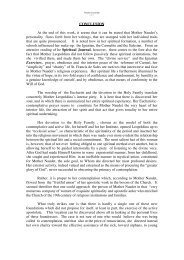
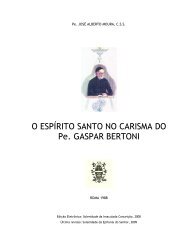
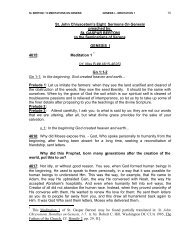
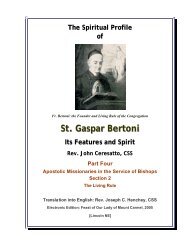
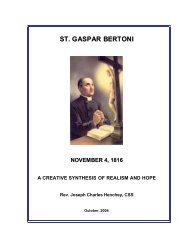
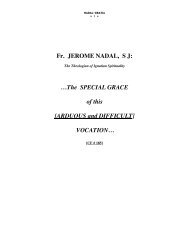
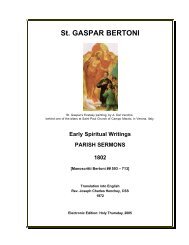
![[B.] St. IGNATIUS of LOYOLA Presentation: The ... - St. Gaspar Bertoni](https://img.yumpu.com/33393889/1/190x245/b-st-ignatius-of-loyola-presentation-the-st-gaspar-bertoni.jpg?quality=85)
